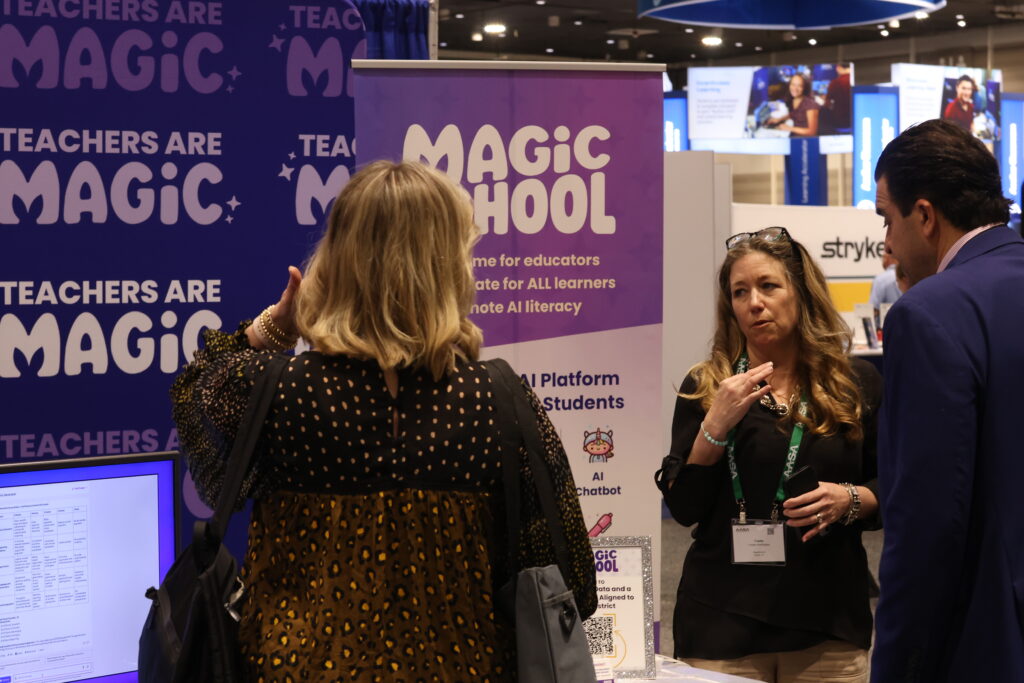Even a quick walk through the 2025 national conference’s exhibit hall will turn up a vendor touting its use of artificial intelligence. From school security solutions to lesson plan creation to creating new ways to help schools run more efficiently, AI-baked tools promise any number of benefits.
Take XSponse, which has trained an AI model to recognize problematic words or the sounds of aggression. Once the tool detects a potential fight brewing among students in a bathroom or another health or safety concern, it immediately alerts staff to respond.
“We’re using AI when seconds count because in a school emergency, seconds can be hours,” said David Terrill, sales engineering director who is staffing his firm’s booth for the two days of the AASA exhibit hall.
Equature is another AI-powered vendor that focuses on security. Through AI, the tool can integrate with a school’s existing security cameras to detect brandished weapons. Once a potential weapon is detected, texts and emails with a picture of the potential firearm are sent immediately to school staff to determine whether it poses a threat — or might be a JROTC drill rifle.
Equature is testing the system at schools across the country. In about a month, it will launch a full release. “We’re very excited to be partnering with these schools to help us test the product and make sure it’s ready,” said Adam Eisler, a territory account manager for the company.
GeoComm, another exhibitor, maps school buildings to provide emergency responders with up-to-date plans of school campuses, so responders can more quickly treat people suffering from an allergic reaction, overdose or other medical or safety issues. It’s using AI to generate the best evacuation routes inside schools and is working to add on a new capability — creating alternative routes in real-time if a primary or secondary one is blocked by a fire or other emergency.
“We’re helping both sides of the equation,” said Bill McCullough, vice president and general manager.
Other AI providers represented among the 333 exhibitors at this year’s conference are focused more on education and other school operations. Wayfinder, for example, uses AI to suggest lessons or activities in areas where students may be lagging, such as accountability, agency or collaboration.
At the MagicSchool booth, representatives were sharing details about its popular platform that can be deployed to support any number of tasks, including creating school bus schedules or devising a master schedule for principals.
MagicSchool includes some 80 AI-powered teaching tools designed to support educators with lesson planning, differentiation in the classroom and writing assessments, among other tasks. “Our whole ethos is that teachers are magic, and we are here to support them in the next generation of education,” said Monica Gilfillan, senior account executive.
At ALEE, which helps teachers with reading and writing instruction, the AI model is trained only on lesson plans that the company created with the help of teachers. “The key for us is making sure there are humans at every single step of the content creation process,” said Marjorie McKeown, ALEE founder and CEO and a former teacher and principal.
As a good number of vendors touted their AI-powered tools, at least one was focused on helping teachers learn the best way to use AI in the classroom. Communications by Design provides courses for teachers and administrators on how they might use AI, how students might use AI and what ethical issues they should consider.
“We’re not telling them they have to use AI,” said Peter Grostic, director of professional learning for Communications by Design. “We’re trying to demonstrate how it could be useful in certain situations.”
(Sarah Lindenfeld Hall, a freelance writer in Raleigh, N.C., is a senior editor with AASA’s Conference Daily Online.)


